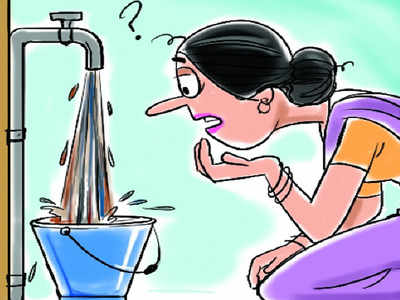The Times of India 07.05.2013
Civic body to set right water supply imbalance
Corporation (PMC) is expected to begin work on equitable distribution of
water in the city in the next few months.
As of now, there is
imbalance in the distribution system. The core areas of the city get
adequate water supply, but the situation is different in the fringe
areas. The civic body has envisaged 100% metered water supply in the
city to tide over this imbalance, said V G Kulkarni, PMC’s water department chief, on Monday.
He was speaking at a seminar on waste water technology for a green economy,
organized by the society for environment education research and
management. A detailed project report on equitable water distribution
would be ready in the next two months. “The civic body has appointed a
consultant for the equitable water distribution project which will be
implemented over four to five years,” Kulkarni said.
“The civic
body is supplying 1,150 MLD (million litres per day) water for the
city’s 40 lakh population. This supply works out to 300 litres per
capita per day (lpcd) which is almost double the yardstick. However, it
is not true that all citizens get that much water. The core city areas
get more than the fringe areas,” Kulkarni said.
The consultant
has been studying the total water distribution system. The civic body
has a total of 70 water reservoirs and the supply is being monitored.
The cost of implementation of equitable distribution of water project is
over Rs 1,500 crore, he said.
The city lacks a water metering
system and citizens pay a lumpsum tax up to Rs 1,100 per year
irrespective of the water they use. The civic body has planned to
implement 100% water metering system, he added.
Sewage
treatment is also a concern as the city is not able to treat the entire
750 MLD sewage generated. The treatment plants have the capacity to
treat only 567 MLD. The civic body has tied up with Maharashtra Jeevan
Pradhikaran to meet the demands for treating all the sewage generated by
2047, he said.
Dwelling on the challenges of management of water, chief engineer of the water resources department of the state government Avinash Surve
said increasing urbanization will result in competition for use of
water for domestic purposes, although water is also essential for
irrigation and industrial purposes.
One of the challenges faced
for management of water is during monsoon as the rainfall pattern is
non-consistent with the past statistical data. “In the past four to five
years, there has been scanty rainfall in June. Rainfall is not well
distributed throughout the season. More rain in a short duration creates
challenges for flood management,” he said.
All dams, he said,
should be filled with water by October 15, the end of the monsoon. “If
dams are not full even after good rains, it is a drought-like
situation,” he said.
Water researcher
Ah Kie Lim stressed the need for international cooperation and sharing
of best practices and ideas on water management. Convenor of the
seminar, Mangesh Kashyap, also spoke.

